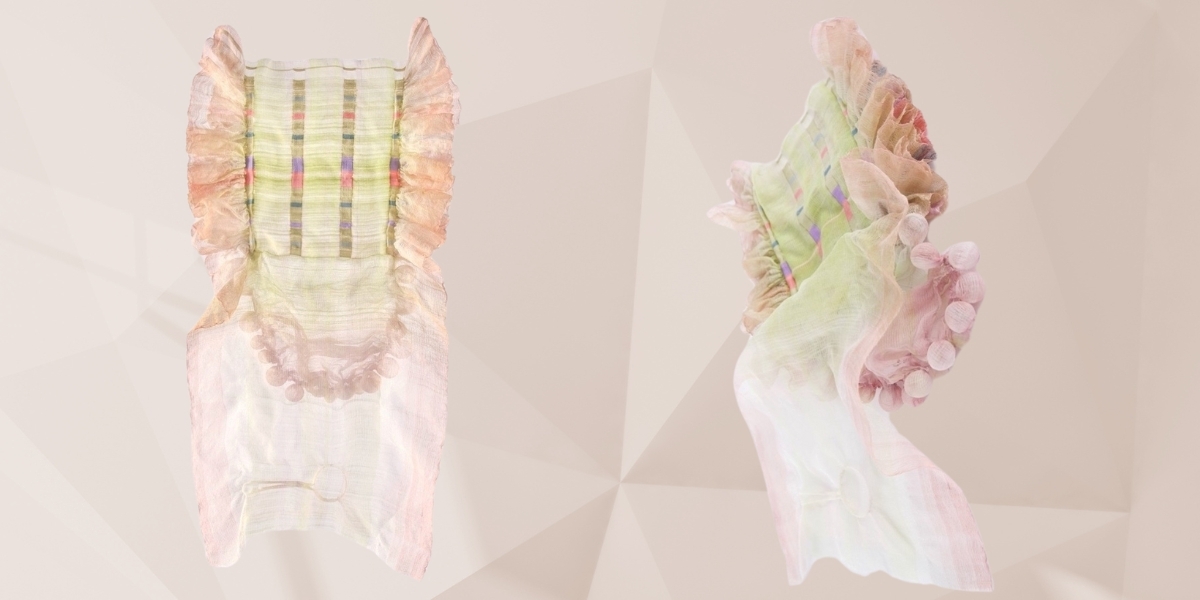By: Elena Hart
In an art world that often prioritizes digital precision and the pursuit of a “perfect” finish, textile artist Yang Yumeng, based in London and focusing on woven art, suggests that her work may never be fully completed. With her ongoing installation Untitled (2024–), created entirely from reconfigured studio waste using a variant of the traditional crackle weave, Yang invites viewers to reconsider not only the conventions of textile formalism but also the art market’s interest in closure and singular authorship. At the same time, her project Dining with Me explores the intersection of fashion, food, and social rituals. In an era that tends to prize the immaculate, Yang’s decision to leave her work unfinished can be seen as a response—an exploration of imperfection in both culinary and textile practices.
Q1: Many contemporary textile artists incorporate waste as a means of sustainability or as an aesthetic tactic. How does your decision to leave Untitled in a perpetual, unfinished state differ from merely adopting a ‘green’ or process-oriented aesthetic?
Yang Yumeng: “What distinguishes this work is its focus on process rather than a simple environmental gesture. I don’t use discarded materials merely for sustainability’s sake; rather, I aim to expose the surplus that inevitably arises in the act of creation. The piece is not designed to elicit sympathy or to serve as a ‘green’ cover-up—it is meant to provoke the viewer into asking why art is often expected to be ‘finished’ at all. The open seams and uneven junctions in the crackle weave intentionally highlight both failure and possibility. This idea also resonates with Dining with Me, where I examine eating as an ongoing, unfinished process, much like art. Both require an engagement with imperfection and an acknowledgment of what is discarded—whether food or materials—as part of a larger creative cycle.”

Q2: Your installation has undergone dramatic spatial expansion—from an initial 7 meters in your studio to 12 meters in Milan, and now reportedly over 20 meters as of April 2025. Critics have debated whether such growth risks the work becoming an endless gestation devoid of clear meaning. What are your thoughts on this critique?
Yang Yumeng: “I’m open to the debate. In fact, the absence of a fixed form is central to the work’s conceptual framework. The continuous expansion reflects the accumulation of time, material residue, and creative memory. If the work were to freeze at a particular moment, it might lose its essence as a living archive of process. Yes, there is a chance that this constant growth could become self-referential, but that is part of the point: it mirrors the ongoing cycles of production and consumption that characterize contemporary society. In Dining with Me, I explore a similar tension between consumption and completion. The unfinished meal, much like unfinished art, invites participants to reconsider how we approach completion in both art and daily life. Just as a meal never truly ends—it is always evolving—so too is the work itself.”

Q3: Your practice draws from traditional techniques, yet you repurpose them to question dominant narratives. In Untitled, the use of crackle weave serves as both an homage and a rupture. Can you elaborate on how you situate this technique within contemporary feminist textile discourse?
Yang Yumeng: “Crackle weave is historically tied to practices where materials—often remnants—were transformed into something beautiful, a technique passed down with the tacit knowledge of generations of women. In my work, I reclaim that tradition not to romanticize it, but to underscore its subversive potential. It expresses resilience in the face of material scarcity and the historical invisibility that has often characterized traditionally feminized craft practices. This work is less about celebration and more about a critical inquiry into how beauty can emerge from neglect and fragmentation. Similarly, Dining with Me engages with the idea of transformation and the overlooked beauty of imperfection. The communal act of dining—particularly with discarded or overlooked ingredients—provides a direct parallel to my exploration of waste in textile and material culture. It’s about reclaiming what has been marginalized and finding value in what is discarded.”
Q4: There is often a fine line between conceptual innovation and conceptual indulgence. Some critics worry that continually expanding an artwork might eventually reduce its impact to a recycled idea. How do you navigate this tension in your practice?
Yang Yumeng: “I’m mindful of that risk. The potential for repetition is certainly present, and it requires me to constantly reinvent the work’s structure and narrative. The evolution of Untitled is not just about growth in size but also about qualitative change; I intervene in its development, reordering its elements and juxtaposing different textures to maintain critical momentum. The work must remain an ongoing dialogue, not a stagnant monument. In Dining with Me, I similarly introduce new variations. Each gathering, each meal, becomes a fresh chapter in a continuing conversation about the intersection of art, food, and social rituals. This constant reinvention ensures the work stays dynamic and provocative.”

Summary
Yang Yumeng’s Untitled (2024–) and Dining with Me offer nuanced interventions against the common expectation of completion in art. Both works transform waste—whether from discarded materials or overlooked food—into open-ended statements that question market logic and conventional aesthetics. Yang’s work, in its visible incompleteness, invites us to reflect on our own expectations of order and perfection, whether in the art world or at the dining table. In a time when the tension between process and product is increasingly pronounced, Yang Yumeng’s radical reappropriation of discarded materials, unfixed forms, and the unfinished nature of life itself represents a significant point of reflection for the future of fiber art and its intersections with contemporary cultural practices.
Published by Jeremy S.


















